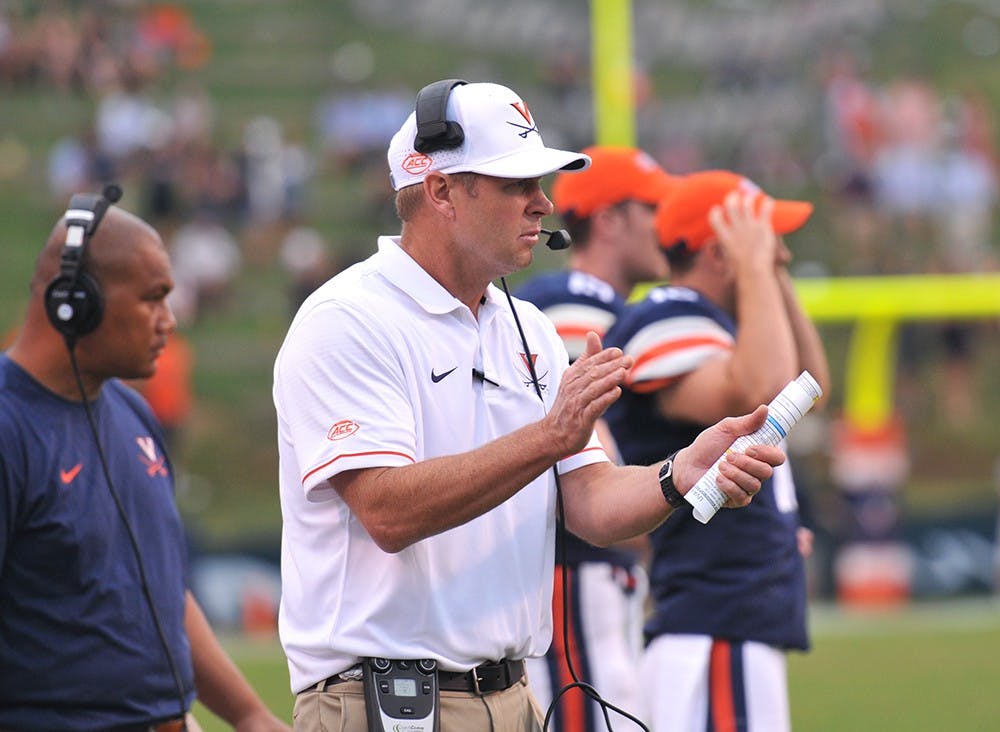There are 37 head coaches in the FBS calling plays on either side of the ball for their football teams this season, according to a list published on coachingsearch.com last month.
The vast majority of these coaches — 32 out of 37 to be exact — act as offensive play-callers. They include big names like No. 2 Florida State’s Jimbo Fisher, No. 7 Stanford’s David Shaw, No. 10 Louisville’s Bobby Petrino and No. 18 Notre Dame’s Brian Kelly. Notice the numerals.
The five outliers who take it upon themselves to call the shots for their defenses are San Diego State’s Rocky Long, Arizona State’s Todd Graham, Vanderbilt’s Derek Mason, Texas Christian’s Gary Patterson and Virginia’s very own Bronco Mendenhall.
Admittedly, it is a small sample size, and we are early on in the season. But still, it is worth noting that their self-guided defenses have not exactly excelled so far. They have combined to surrender nearly 31 points per game.
Last year, the same quintet of head coaches — Long, Graham, Mason, Patterson and Mendenhall (while at Brigham Young) — were again the only ones who called their teams’ defensive plays. Their units did not fair too well in 2015 either, as they combined to allow an average of roughly 24 points per game.
This notion of a head coach calling his defense seems to be of western origin, especially when you consider even Mendenhall and Mason, who now coach in the southeast, spent their playing years and a large portion of their coaching careers out west. Mason previously served as assistant head coach at Stanford from 2010-13, while Mendenhall led the Cougars.
The question to ask is why there are so few coaches in college football who take over defensive play-calling duties. Nick Saban, Kirby Smart and Mark Dantonio do not do it. They delegate.
Mendenhall has not always done it. Over his 11-year tenure as coach at Brigham Young, he went back and forth. For instance, Mendenhall yielded play-calling duties at the start of the 2014 season to then-defensive coordinator Nick Howell.
But after the Cougars yielded an average of 391.5 yards and 27.5 points per game that year, boosters in Provo, UT pressured Mendenhall into a change. Instead of letting Howell go, Mendenhall again assumed the role of defensive playcaller. In 2015, the former defensive back at Snow College and later Oregon State slightly improved his defense’s points allowed average to 22.8 per game.
When Mendenhall moved to Charlottesville, he brought along Howell to serve as defensive coordinator. Mendenhall made it clear from the start, though, he would call the shots despite Howell’s title of defensive coordinator or his vantage point in the press box. And Mendenhall has followed through on that promise whether he trusts his assistant or not.
“[Coach] is very hands-on with the defense,” junior linebacker Micah Kiser said. “He’s making all the calls out there. He’s walking around each position group in individuals. So his hands are all over the defense… He demands a lot out of the defense.”
Concern lies in whether Mendenhall devotes too much time in game and practice to his defensive unit. It would appear to be the opposite, because if he has spent too much time, the hard truth is it has not showed yet. In their two ugly losses to start the season, the Cavaliers have allowed an average of 578 yards and 40.5 points per game.
Blown coverages, missed tackles and mental miscues have been the norm. Stops have been scarce. When you cannot even get off the field on a third-down and 36, which the Virginia defense failed to do Saturday night against No. 22 Oregon in a 13-6 game, that tends to highlight massive incompetence, no matter the caliber of your opponent. Ultimately, Mendenhall is the man held responsible.
He is one of those few and proud FBS coaches who call the shots for their team's defense, but maybe Mendenhall is letting his pride get in the way of his unit’s performance.







